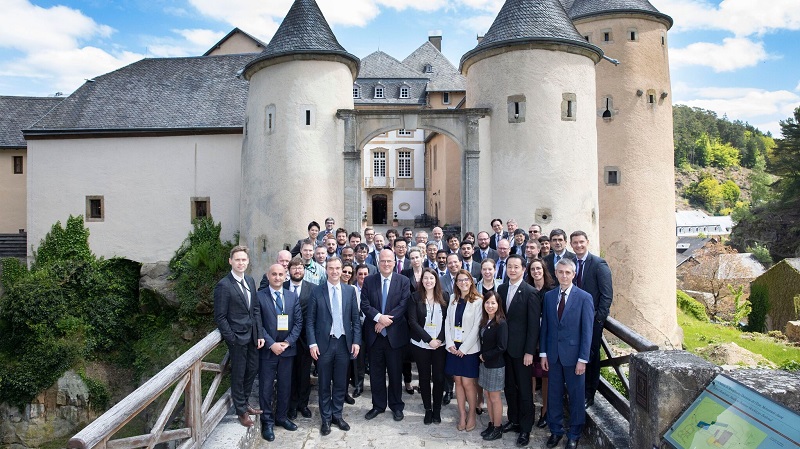
Speakers and participants pose for a photo at the 3rd RFA Research Seminar held in May 16 and 17, 2019, in Luxembourg. Photo: ESM/Steve Eastwood
Luxembourg, May 16, 2019 – The regional rescue funds will discuss, at their 3rd Joint Research Seminar in Luxembourg, how to detect, analyse, prevent and tackle sovereign risk and how they can provide enhanced support, given the heightened global risks related to trade tensions, geopolitical challenges and economic and market uncertainties.
The Regional Financing Arrangements (RFAs) Research Seminar is an annual event that brings together scholars and institutions to discuss technical issues relevant for RFAs’ operations. The ASEAN+3 Macroeconomic Research Office (AMRO), the European Stability Mechanism (ESM), and the Latin American Reserve Fund (FLAR) initiated this series of research seminars in 2017. Previous research seminars took place in Singapore and in Cartagena de Indias, Colombia.
“Academic research into the reasons behind financial crises and the efficacy of our policy tools plays an essential role in preparing us for potential crises going forward. This year, for the first time, technical experts from all seven major RFAs were able to be present, a clear recognition of the relevance and success of the two previous seminars,” said Klaus Regling, Managing Director at the ESM.
For the 3rd Joint RFA Research Seminar, organizers reached out to academics and researchers to have the latest studies available to enrich the discussion. The participants’ discussions will focus on current sovereign risks, highlighting banking sector issues, long-term fiscal costs, financial stress in lender countries and capital outflows from emerging market countries.
“Currently, the world is more indebted than a decade ago, both in the private as well as in the public realms. Although emerging and developing economies show a lower indebtedness than developed economies, their debt has been growing over the past 10 years and its cost is higher than it is for advanced economies. This demands a close surveillance of the economies,” pointed out José Darío Uribe, Executive President of FLAR.
The International Monetary Fund, the European Central Bank and AMRO will present their models and indicators to help detect sovereign risks, contributing to the discussion on how institutions could get better prepared with various early warning systems. Finally, participants will debate how to prepare the Global Financial Safety Net to detect risks early and fight the next crisis, and how to adjust policy to improve the effectiveness of defence mechanisms.
“Strong coordination is required among all players of the international financial system to prepare for the next crisis that could hit us. This research seminar is an important avenue to discuss issues that are crucial to strengthen each RFA’s capacity as well as the coordination among different layers of the Global Financial Safety Net,” said Yasuto Watanabe, Deputy Director of AMRO.
In addition to AMRO, as the macroeconomic surveillance arm of the Chiang Mai Initiative Multilateralisation, FLAR and the ESM, the other RFAs present at the seminar are the Arab Monetary Fund (AMF), the BRICS Contingent Reserve Arrangement (BRICS CRA) represented by the Central Bank of Brazil, the Eurasian Fund for Stabilization and Development (EFSD), the European Commission, through the EU Balance of Payments Facility. The IMF and the Bank for International Settlement, which both support global financial stability, also participated.
In addition to this technical-level gathering, the heads of RFAs and representatives of the IMF meet once a year at the High-level RFA policy dialogue to discuss the collaboration between the IMF and RFAs and among RFAs themselves. The 4th RFA High-Level Dialogue will convene on 16 October 2019 in Washington, D.C., on the sidelines of the IMF/World Bank Annual Meetings.
